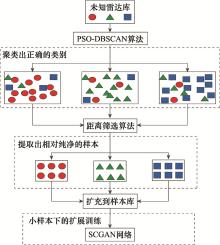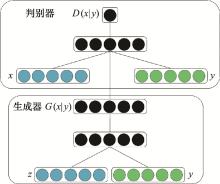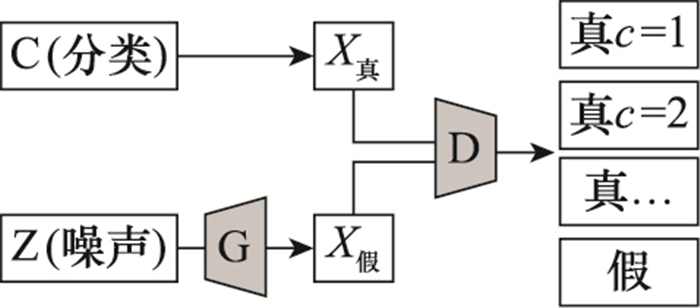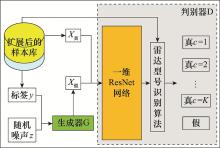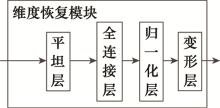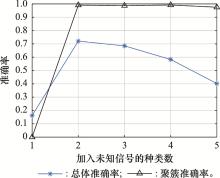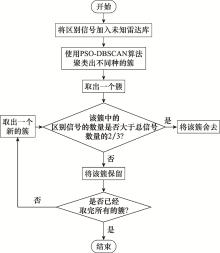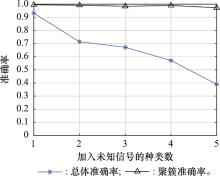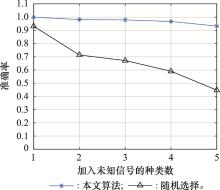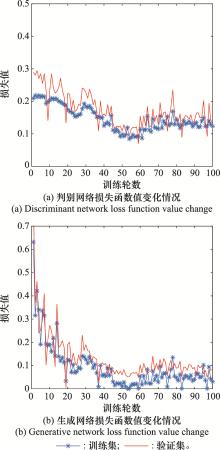Systems Engineering and Electronics ›› 2022, Vol. 44 ›› Issue (4): 1158-1165.doi: 10.12305/j.issn.1001-506X.2022.04.11
• Sensors and Signal Processing • Previous Articles Next Articles
Unknown radar signal processing based on PSO-DBSCAN and SCGAN
Pengyu CAO1,*, Chengzhi YANG1, Limeng SHI2, Hongchao WU1
- 1. School of Air Operations and Services, Aviation University of Air Force, Changchun 130022, China
2. Unit 93671 of the PLA, Nanyang 474350, China
-
Received:2021-01-08Online:2022-04-01Published:2022-04-01 -
Contact:Pengyu CAO
CLC Number:
Cite this article
Pengyu CAO, Chengzhi YANG, Limeng SHI, Hongchao WU. Unknown radar signal processing based on PSO-DBSCAN and SCGAN[J]. Systems Engineering and Electronics, 2022, 44(4): 1158-1165.
share this article
| 1 |
WANG Q S , BAI J , HUANG X Y , et al. Analysis of radar emitter signal sorting and recognition model structure[J]. Procedia Computer Science, 2019, 154, 500- 503.
doi: 10.1016/j.procs.2019.06.076 |
| 2 |
XU X , WANG W , WANG J H . A three-way incremental-learning algorithm for radar emitter identification[J]. Frontiers of Computer Science, 2016, 10 (4): 673- 688.
doi: 10.1007/s11704-015-4457-7 |
| 3 |
ZHANG C H , HAN Y T , ZHANG P , et al. Research on modern radar emitter modell ing technique under complex electromagnetic environment[J]. The Journal of Engineering, 2019, 2019 (20): 7134- 7138.
doi: 10.1049/joe.2019.0579 |
| 5 | SHEN J H , HUANG J C , ZHU Y C , et al. Overview of radar signal fast recognition[J]. Electronic Information Warfare Technology, 2017, 32 (5): 5- 10. |
| 6 |
LI Y B , GE J , LIN Y , et al. Radar emitter signal recognition based on multi-scale wavelet entropy and feature weighting[J]. Journal of Central South University, 2014, 21 (11): 4254- 4260.
doi: 10.1007/s11771-014-2422-5 |
| 7 |
LI L , JI H B . Radar emitter recognition based on cyclostationary signatures and sequential iterative least-square estimation[J]. Expert Systems with Applications, 2011, 38 (3): 2140- 2147.
doi: 10.1016/j.eswa.2010.07.155 |
| 8 | WANG Y H , ZHANG S C , ZHANG Y W , et al. A cooperative spectrum sensing method based on empirical mode decomposition and information geometry in complex electromagnetic environment[J]. Complexity, 2019, 2019 (7): 1- 13. |
| 9 | PETROV N , JORDANOV I , ROE J . Radar emitter signals recognition and classification with feedforward networks[J]. Procedia Computer Science, 2013, 2 (2): 1192- 1200. |
| 10 |
YANG Z T , WU Z L , YIN Z D , et al. Hybrid radar emitter recognition based on rough K-means classifier and relevance vector machine[J]. Sensors, 2013, 13 (1): 848- 864.
doi: 10.3390/s130100848 |
| 11 |
YANG Z T , QIU W , SUN H J , et al. Robust radar emitter recognition based on the three-dimensional distribution feature and transfer learning[J]. Sensors, 2016, 16 (3): 289- 302.
doi: 10.3390/s16030289 |
| 12 |
VISHAL P , PAJESH K S . Convolutional support vector machines for speech recognition[J]. International Journal of Speech Technology, 2019, 22 (3): 601- 609.
doi: 10.1007/s10772-018-09584-4 |
| 13 |
LIU N B , XU Y N , TIAN Y H , et al. Background classification method based on deep learning for intelligent automotive radar target detection[J]. Future Generation Computer Systems, 2019, 94, 524- 535.
doi: 10.1016/j.future.2018.11.036 |
| 14 | SALAKHUTDINOV R, HINTON G E. Deep Boltzmann machines[C]//Proc. of the 12th International Conference on Artificial Intelligence and Statistics, 2009: 448-445. |
| 15 | JEFF H . Ian Goodfellow, Yoshua Bengio, and Aaron Courville: deep learning[J]. Genetic Programming & Evolvable Machines, 2018, 19, 305- 307. |
| 16 |
WANG S H , PHILLIPS P , SUI Y , et al. Classification of Alzheimer's disease based on eight-layer convolutional neural network with leaky rectified linear unit and max pooling[J]. Journal of Medical Systems, 2018, 42 (5): 85.
doi: 10.1007/s10916-018-0932-7 |
| 17 |
YUAN X Y , HE P , ZHU Q L , et al. Adversarial examples: attacks and defenses for deep learning[J]. IEEE Trans.on Neural Networks and Learning Systems, 2019, 30 (9): 2805- 2824.
doi: 10.1109/TNNLS.2018.2886017 |
| 18 | HE K M, ZHANG X Y, REN S Q, et al. Deep residual learning for image recognition[C]//Proc. of the IEEE Conference on Computer Vision & Pattern Recognition, 2016. |
| 19 | HE K M, ZHANG X Y, REN S Q, et al. Delving deep into rectifiers: surpassing human-level performance on imagenet classification[C]//Proc. of the IEEE International Conference on Compwter Vision, 2015. |
| 20 |
O'SHEA T J , ROY T , CLANCY T C . Over the air deep learning based radio signal classification[J]. IEEE Journal of Selected Topics in Signal Processing, 2018, 12 (1): 168- 179.
doi: 10.1109/JSTSP.2018.2797022 |
| 21 | 张怡霄, 郭文普, 康凯, 等. 基于数据场联合PRI变换与聚类的雷达信号分选[J]. 系统工程与电子技术, 2019, 41 (7): 1509- 1515. |
| ZHANG Y X , GUO W P , KANG K , et al. Radar signal sorting method based on data field combined PRI transform and clustering[J]. Systems Engineering and Electronics, 2019, 41 (7): 1509- 1515. | |
| 22 | 张怡霄, 郭文普, 康凯, 等. 基于聚类和时序相关的重点雷达信号快速识别[J]. 系统工程与电子技术, 2020, 42 (3): 597- 602. |
| ZHANG Y X , GUO W P , KANG K , et al. Key radar signal fast recognition method based on clustering and time-series correlation[J]. Systems Engineering and Electronics, 2020, 42 (3): 597- 602. | |
| 23 | 朱克凡, 王杰贵. 小样本条件下SCGAN+CNN低分辨雷达目标一步识别算法[J]. 系统工程与电子技术, 2020, 42 (1): 67- 75. |
| ZHU K F , WANG J G . Low-resolution radar target one-step recognition algorithm based on SCGAN+CNN with a limited training data[J]. Systems Engineering and Electronics, 2020, 42 (1): 67- 75. | |
| 24 |
秦鑫, 黄洁, 查雄, 等. 基于扩张残差网络的雷达辐射源信号识别[J]. 电子学报, 2020, 48 (3): 456- 462.
doi: 10.3969/j.issn.0372-2112.2020.03.006 |
|
QIN X , HUANG J , ZHA X , et al. Radar emitter signal recognition based on dilated residual network[J]. Acta Electronica Sinica, 2020, 48 (3): 456- 462.
doi: 10.3969/j.issn.0372-2112.2020.03.006 |
|
| 25 |
石礼盟, 杨承志, 吴宏超. 基于深层残差网络和三元组损失的雷达信号识别方法[J]. 系统工程与电子技术, 2020, 42 (11): 2506- 2512.
doi: 10.3969/j.issn.1001-506X.2020.11.12 |
|
SHI L M , YANG C Z , WU H C . Radar signal recognition method based on deep residual network and triplet loss[J]. Systems Engineering and Electronics, 2020, 42 (11): 2506- 2512.
doi: 10.3969/j.issn.1001-506X.2020.11.12 |
|
| 26 |
GU L L , LIU Y , ZHEN J Q . Optimization of PSO algorithm based on adaptive inertia weight and escape strategy[J]. Journal of Physics: Conference Series, 2020, 1486 (3): 32033- 32039.
doi: 10.1088/1742-6596/1486/3/032033 |
| 27 |
ZHAN L W , LI C W . A hybrid PSO-SVM-based method for predicting the friction coefficient between aircraft tire and coating[J]. Measurement Science and Technology, 2017, 28 (2): 025004.
doi: 10.1088/1361-6501/aa506d |
| 28 |
HOU J , GAO H J , LI X L . DSets-DBSCAN: a parameter-free clustering algorithm[J]. IEEE Trans.on Image Processing, 2016, 25 (7): 3182- 3193.
doi: 10.1109/TIP.2016.2559803 |
| 29 |
IENCO D , BORDOGNA G . Fuzzy extensions of the DBSCAN clustering algorithm[J]. Soft Computing, 2018, 22 (5): 1719- 1730.
doi: 10.1007/s00500-016-2435-0 |
| 30 |
SHEN J B , HAO X P , LIANG Z Y , et al. Real-time superpixel segmentation by DBSCAN clustering algorithm[J]. IEEE Trans.on Image Processing, 2016, 25 (12): 5933- 5942.
doi: 10.1109/TIP.2016.2616302 |
| 31 |
SCITOVSKI R , SABO K . DBSCAN-like clustering method for various data densities[J]. Pattern Analysis and Applications, 2020, 23 (2): 541- 554.
doi: 10.1007/s10044-019-00809-z |
| 32 |
GALAN S F . Comparative evaluation of region query strategies for DBSCAN clustering[J]. Information Sciences, 2019, 502, 76- 90.
doi: 10.1016/j.ins.2019.06.036 |
| 33 |
BRYANT A C , CIOS K J , BRYANT A , et al. RNN-DBSCAN: a density-based clustering algorithm using reverse nearest neighbor density estimates[J]. IEEE Trans.on Knowledge and Data Engineering, 2018, 30 (6): 1109- 1121.
doi: 10.1109/TKDE.2017.2787640 |
| 34 | 王坤峰, 苟超, 段艳杰, 等. 生成式对抗网络GAN的研究进展与展望[J]. 自动化学报, 2017, 43 (3): 321- 332. |
| WANG K F , GOU C , DUAN Y J . Generative adversarial networks: the state of the art and beyond[J]. Acta Automatica Sinica, 2017, 43 (3): 321- 332. |
| [1] | Jianfeng YANG, Heye XIAO, Liang LI, Junqiang BAI, Weihao DONG. Multi-level module partition method of UAV based on fuzzy clustering and expert scoring mechanism [J]. Systems Engineering and Electronics, 2022, 44(8): 2530-2539. |
| [2] | Siyu DU, Yinghui QUAN, Minghui SHA, Wen FANG, Mengdao XING. Waveform optimization for SFA radar based on evolutionary particle swarm optimization [J]. Systems Engineering and Electronics, 2022, 44(3): 834-840. |
| [3] | Chenrui SHI, Lu TIAN, Zhan XU, Ruxin ZHI, Jinhui CHEN. Effectiveness evaluation method of emergency communication and sensing equipment based on PSO-BP [J]. Systems Engineering and Electronics, 2022, 44(11): 3455-3462. |
| [4] | Fuyu LU, Ningning TONG, Weike FENG, Pengcheng WAN. Adaptive hybrid annealing particle swarm optimization algorithm [J]. Systems Engineering and Electronics, 2022, 44(11): 3470-3476. |
| [5] | Haoyang LI, Jianjun XIANG, Fang PENG, Shuai WANG, Zhijun LI. Beam space generalized sidelobe canceller algorithm based on particle swarm optimization [J]. Systems Engineering and Electronics, 2022, 44(10): 3037-3045. |
| [6] | Kun WANG, Shuxian HOU, Li WANG. APU performance parameter prediction model based on adaptive variation PSO-SVM [J]. Systems Engineering and Electronics, 2021, 43(2): 526-536. |
| [7] | Shuai ZHAO, Songtao LIU, Huiyang WANG. LPI radar waveform recognition algorithm based on PSO-CNN [J]. Systems Engineering and Electronics, 2021, 43(12): 3552-3563. |
| [8] | Yuzhao MA, Qiangqiang WANG, Ruisong WANG, Xinglong XIONG. Optical fiber perimeter vibration signal recognition based on SVD and MPSO-SVM [J]. Systems Engineering and Electronics, 2020, 42(8): 1652-1661. |
| [9] | Zhigang SU, Xinran CHEN, Jingtang HAO. Circular array beamforming method based on particle swarm optimization [J]. Systems Engineering and Electronics, 2020, 42(7): 1449-1454. |
| [10] | Xu LYU, Baiqing HU, Yongbin DAI, Renjie ZHAO. Application of USQUE based on PSO in attitude estimation of integrated navigation [J]. Systems Engineering and Electronics, 2020, 42(6): 1366-1371. |
| [11] | Shuqiang ZHANG, Fucheng GUO, Min ZHANG, Xi LI. Influence analysis of atmospheric refraction on elevation-constrained TDOA source localization error and its correction [J]. Systems Engineering and Electronics, 2020, 42(3): 521-527. |
| [12] | WANG Caiyun, HUANG Panpan, LI Xiaofei, WANG Jianing, ZHAO Huanyue. Radar HRRP target recognition based on AEPSO-SVM algorithm [J]. Systems Engineering and Electronics, 2019, 41(9): 1984-1989. |
| [13] | HU Teng, LIU Zhanjun, LIU Yang, XIA Shuaishuai, CHEN Qianbin. 3D surveillance path planning for multi-UAVs [J]. Systems Engineering and Electronics, 2019, 41(7): 1551-1559. |
| [14] | PENG Yaqi, XU Chengdong, NIU Fei, ZHENG Xueen, WANG Yiwen. Prediction model of broadcast ephemeris orbit error based on PSO-BP neural network [J]. Systems Engineering and Electronics, 2019, 41(7): 1617-1622. |
| [15] | WANG Ju, LIU Fuxian, JIN Chunjie. Motif discovery algorithm for uncertain time series based on PSO [J]. Systems Engineering and Electronics, 2018, 40(7): 1639-1645. |
| Viewed | ||||||
|
Full text |
|
|||||
|
Abstract |
|
|||||
